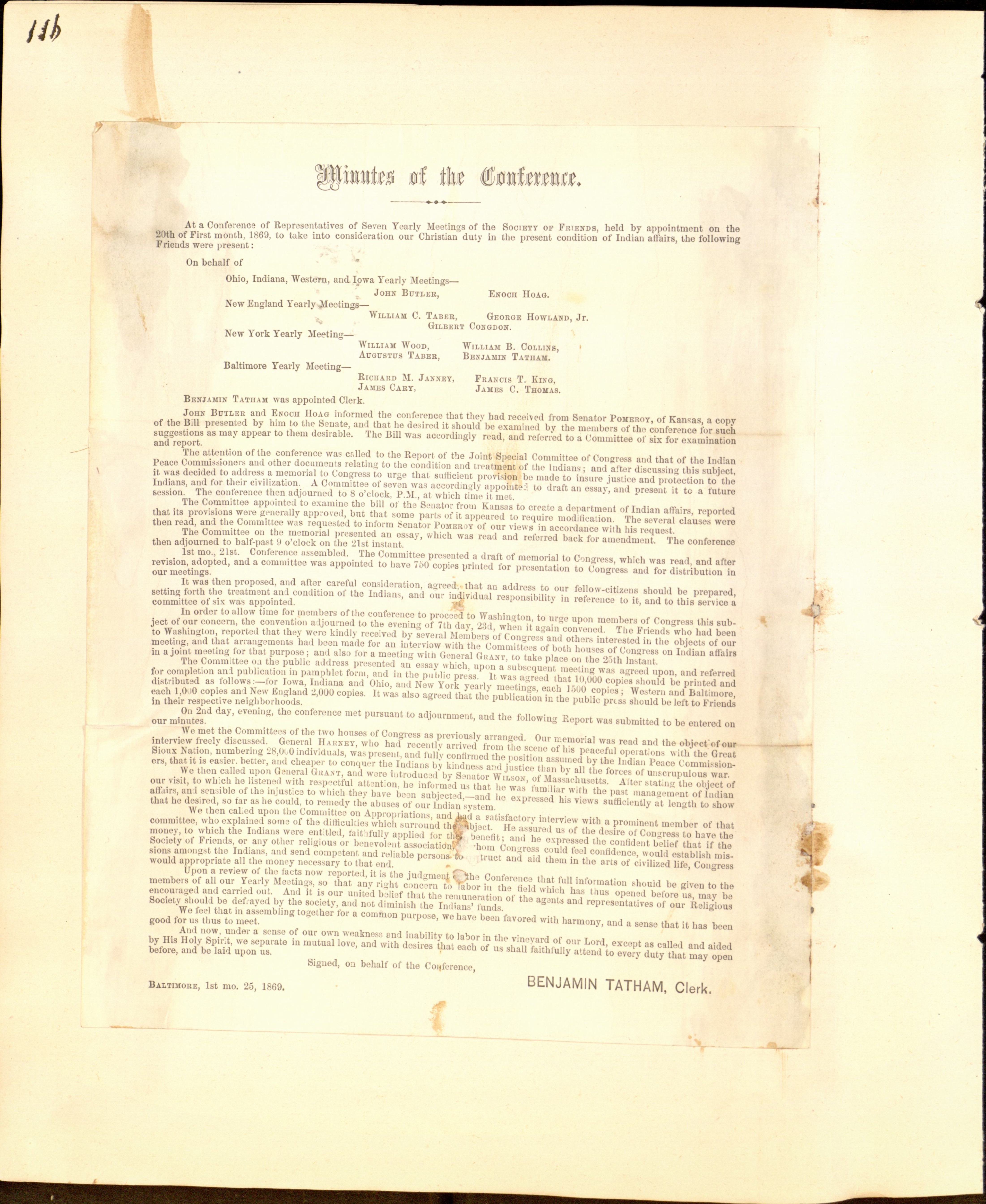Minutes of the Conference.
At a Conference of Representatives of Seven Yearly Meetings20th of First month, 1869, to take into consideration Christian duty in the present condition of Indian affairs, the following
Friends were present:
On behalf of Ohio
JOHN BUTLER
WILLIAM C. TABER
GILBERT CONGDON
WILLIAM WOOD
AUGUSTUS TABER
RICHARD M. JANNEY
JAMES CARY
BENJAMIN TATHAM
of the Bill presented by him to the Senate, and that he desired it should be examined by the members of the conference for such
suggestions as may appear to them desirable. The Bill was accordingly read, and referred to a Committee of six for examination
and report.
The attention of the conference was called to the Report of the Joint Special Committee of Congress
Peace Commissioners and other documents relating to the condition and treatment of the Indians; and after discussing this subject,
it was decided to address a memorial to Congress
Indians, and for their civilization. A Committee of seven was accordingly appointed to draft an essay, and present it to a future
session. The conference then adjourned to 8 o’clock, P.M., at which time it met.
The Committee appointed to examine the bill of the Senator from Kansas
that its provisions were generally approved, but that some parts of it appeared to require modification. The several clauses were
then read, and the Committee was requested to inform Senator POMEROY
The Committee on the memorial presented an essay, which was read and referred
back for amendment. The conference
then adjourned to half-past 9 o’clock on
the 21st instant.
1st mo., 21st. Conference assembled. The Committee presented a draft of memorial to Congress
revision, adopted, and a committee was appointed to have 750 copies printed for presentation to Congress
our meetings.
It was then proposed, and after careful consideration, agreed, that an address to
our fellow-citizens should be prepared,
setting forth the treatment and
condition of the Indians, and our indibidual responsibility in reference to it,
and to this service a
committee of six was appointed.
In order to allow time for members of the conference to proceed to Washington
ject of our concern, the convention adjourned to the evening of 7th day, 23rd, when it again convened. The Friends who had been
to Washington
meeting, and that arrangements had been made for an interview with the Committees of both houses of Congress
in a joint meeting for that purpose; and also for a meeting with General GRANT
The Committee on the public address presented an essay which, upon a subsequent
meeting was agreed upon, and referred
for completion and publication in
pamphlet form, and in the public press. It was agreed that 10,000 copies should
be printed and
distributed as follows:--for Iowa, Indiana and Ohio, and New
York yearly meetings, each 1500 copies; Western and Baltimore,
each 1,000
copies and New England 2,000 copies. It was also agreed that the publication in
the public press should be left to Friends
in their respective
neighborhoods.
On 2nd day, evening, the conference met pursuant to adjournment, and the
following Report was submitted to be entered on
our minutes.
We met the Committees of the two houses of Congress
interview freely discussed. General HARNEY
Sioux Nation
ers, that it is easier, better, and cheaper to conquer the Indians by kindness and justice than by all the forces of unscrupulous war.
We then called upon General GRANT
our visit, to which he listened with respectful attention, he informed us that he was familiar with the past management of Indian
affairs, and sensible of the injustice to which they have been subjected,--and he expressed his views sufficiently at length to show
that he desired, so far as he could, to remedy the abuses of our Indian system.
We then called upon the Committee on Appropriations, and had a satisfactory
interview with a prominent member of that
committee, who explained some of
the difficulties which surround the subject. He assured us of the desire of
Congress
money, to which the Indians were entitled, faithfully applied for the benefit; and he expressed the confident belief that it the
Society of Friends, or any other religious or benevolent association, in whom Congress
sions amongst the Indians, and send competent and reliable persons to instruct and aid them in the arts of civilized life, Congress
would appropriate all the money necessary to that end.
Upon a review of the facts now reported, it is the judgment of the Conference
that full information should be given to the
members of all our Yearly
Meetings, so that any right concern to labor in the field which has thus opened
before us, may be
encouraged and carried out. And it is our united belief
that the remuneration of the agents and representatives of our Religious
Society should be defrayed by the society, and not diminish the Indians’
funds.
We feel that in assembling together our own weakness and inability to labor in
the vineyard of our Lord, except as called and aided
by His Holy Spirit, we
separate in mutual love, and desires that each of us shall faithfully attend to
every duty that may open
before, and be laid upon us.
BENJAMIN TATHAM,

